Explore the intricacies of Python programming with the 'Programación en Python II: aprendiendo a estructurar datos' course from Pontificia Universidad Católica de Chile. This comprehensive program delves into advanced data structuring, object-oriented programming, and recursive algorithms.
Throughout this course, you will learn to distinguish tools for modeling complex programs, including inheritance and polymorphism. You will utilize sequential and non-sequential data structures for efficient data storage and retrieval, creating your own simple data types through class concepts, objects, attributes, and methods. Additionally, you will build algorithmic solutions using the recursive programming model.
Module 1 introduces the course, followed by a deep dive into sequential data structures in Module 2, covering topics such as lists, tuples, stacks, and queues. Module 3 expands on non-sequential data structures, exploring sets and dictionaries. Subsequent modules focus on custom data types, interactions between different types, and the concept of recursive calls. The course is a must for those aiming to develop complex algorithms and represent intriguing problems through programming.
Certificate Available ✔
Get Started / More Info
Dive into advanced Python programming with 'Programación en Python II: aprendiendo a estructurar datos'. Master sequential and non-sequential data structures, object-oriented programming, and recursive problem-solving, and enhance your algorithmic skills.
Module 1: Introducción y bienvenida - This module provides an introduction to the course, offering a warm welcome to students.
Module 2: Semana 1 - Delve into sequential data structures, covering lists, tuples, stacks, and queues.
Module 3: Semana 2 - Explore non-sequential data structures, including sets and dictionaries, along with their applications and operations.
Module 4: Semana 3 - Learn to define and utilize custom data types through classes, objects, attributes, and methods.
Module 5: Semana 4 - Discover interactions between different custom data types, including overriding and inheritance.
Module 6: Semana 5 - Understand the concept of recursive calls and their applications in problem-solving.
Module 7: Semana 6 - Explore the concept of recursive functions and their resolution of complex problems.
Module 8: Cierre - Conclude the course with a closing video and a final survey to summarize the learning experience.
The Introductory C Programming specialization at Duke University equips learners with essential programming fundamentals to solve complex problems and prepare for...
Learn C++ decision programming to create an application that determines zodiac signs based on birth month and day.
Welcome to IBM COBOL – Data and File Management! This course provides hands-on experience with COBOL data and file management, covering fundamental COBOL code...
Embark on an immersive journey through the "Dive Deep into Python" course, mastering core Python concepts, advanced data structures, OOP principles, and...